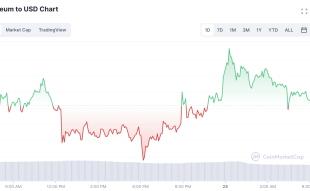Join Our Telegram channel to stay up to date on breaking news coverage
Kate Brady, who heads the Next Gen DTC Connections and Innovation team at PepsiCo, recently spoke at the CoinDesk Consensus 2023 conference in Austin, Texas. She highlighted the challenges that companies face in rolling out Web 3 strategies due to a lack of regulatory clarity.
She highlighted that complying with existing regulations is difficult because they are outdated and do not account for Web3 technologies. This situation limits the potential of Web3 to deepen relationships with customers and audiences.
Industry Experts Agree With Brady On Need For Better Regulations
Many brands, including Reddit, Starbucks, Nike, Adidas, and PepsiCo, have integrated Web3 and non-fungible tokens (NFTs) into their strategies to deepen their relationships with their customers. However, regulatory unclarity has been a challenge for them due to the recent enforcement activity in the US.
“We have to structure ourselves to comply with the current regulations, and unfortunately they are very limited or antiquated based on the 1940s written securities laws,” Brady stated. “Until we can figure out a lot of that, we’re still limited in what we’re doing.”
Serotonin CEO Amanda Cassatt agreed, noting that regulatory clarity leads to growth. She mentioned the European Parliament’s recent passing of the Markets in Crypto Assets (MiCA) legislation.
The legislation distinguishes between centralized and decentralized projects in the space, as an example of high-quality regulation that makes that distinction and pushes people toward a true decentralized blockchain.
Shiva Rajaraman, the Chief Business Officer at OpenSea, highlighted that brands are striving to use more accessible language to appeal to a wider range of customers, moving away from terminology that is specific to the world of cryptocurrency.
Rajaraman emphasized the need for brands to find their own language and easy ways to onboard new audiences.
“Maybe it’s about the intersection between a brand’s language, what they want their community to say and do,” “Start with that, and then try to map Web 3 principles or artifacts onto that,” Rajaraman said.
Cassatt explained that the key is to create a poetic fusion between a brand’s DNA, its success in Web 2, comprehension of the foundation of Web 3, and finding ways to merge all these elements to create something novel.
Coinbase’s Call for Clearer Crypto Regulations in the US
Coinbase, a prominent cryptocurrency exchange, had petitioned a US federal court to compel the Securities and Exchange Commission (SEC) to provide regulatory clarity in the digital assets industry.
Coinbase filed an appeal under the Administrative Procedure Act against the SEC, asking the regulatory body to offer “regulatory clarity” regarding the application of existing securities regulations to crypto assets.
In July 2022, Coinbase put forward a request to the SEC for more clear and straightforward regulatory rules for the crypto industry in the United States.
Coinbase argues that the lack of regulatory clarity is hindering the industry’s growth and that over 1,700 businesses and individuals have filed comments on its petition, reiterating the desire for regulatory clarity.
In the filing, Coinbase emphasized that existing SEC registration and disclosure requirements are incompatible with digital assets that fundamentally differ from traditional securities, such as stocks, bonds, and investment contracts.
The exchange argues that the SEC must specify how many ineffective and inapplicable standards will be applied to digital assets. However, the SEC has refused to do so, prompting Coinbase to seek regulatory clarity.
According to the exchange, the SEC needs to clarify how many irrelevant and ineffective standards will be imposed on digital assets, but the regulatory body has declined to do so, leading Coinbase to pursue greater regulatory transparency.
About a month ago, the SEC issued Coinbase a Wells notice, indicating its intention to sue the exchange for purported violations of U.S. securities law. As a result, Coinbase’s complaint against the SEC has been filed.
Coinbase is set to respond to the charges by the end of the week, but its recent filing is being viewed as a proactive step to assert that the SEC’s approach does not offer adequate regulatory guidance to US-based businesses operating in the cryptocurrency sector.
The lack of regulatory clarity has been a significant issue in the cryptocurrency industry. The ambiguity surrounding the classification of digital assets and the application of existing securities laws has led to confusion and uncertainty among market participants. This lack of clarity has been identified as a significant hurdle to the industry’s mainstream adoption.
Crypto Needs Regulatory Clarity For Mainstream Adoption
The lack of regulatory clarity in the cryptocurrency industry has been a major hurdle to its mainstream adoption. Without clear guidelines on how existing securities regulations apply to digital assets, businesses and investors are hesitant to engage with the industry.
This lack of clarity also creates a gray area that can be exploited by bad actors, leading to market manipulation and fraud. Furthermore, without clear regulations, the industry can’t attract institutional investors who are subject to strict compliance requirements.
Coinbase’s move to compel the SEC to provide regulatory clarity is not an isolated incident. As the cryptocurrency industry continues to grow, we may see more instances of companies challenging regulatory bodies to provide clear guidelines on digital assets.
The development of regulations that balance innovation and consumer protection is critical to the industry’s growth and stability. The regulatory bodies must work with industry players to develop guidelines that protect consumers while allowing innovation to flourish.
Related Articles
Join Our Telegram channel to stay up to date on breaking news coverage


